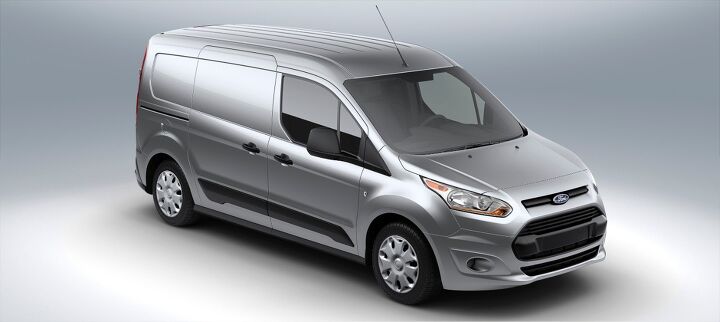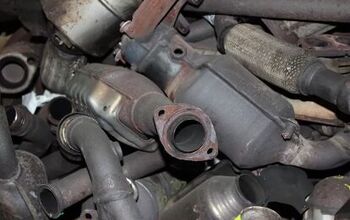Small Vans Take 26% Of U.S. Commercial Van Market In January 2015
Ford’s second-generation Transit Connect is losing market share at a furious rate.
However, that’s not a valid commentary on the Transit Connect, but rather a side effect of a revolution in the small commercial van category.
Transit Connect sales jumped 72% in the first month of 2015 to the highest January level in the model’s brief history. 55% of the small commercial van category belonged to the Transit Connect in January 2015, down from 71% in January 2014 despite the Transit Connect’s 1543-unit improvement.
The cause for the Ford’s market share losses? The established competition – rival vans which were on sale a year ago – posted even greater percentage gains. Added to that are new vans: a twin of the Nissan NV200 from Chevrolet, and a Fiat Doblo-based ProMaster City from Ram.
These four Transit Connect alternatives collectively produced a 231% year-over-year improvement to 2963 sales, 726 units shy of the Ford’s total.
Small Commercial VanJanuary2015January2014% ChangeChevrolet City Express 585——Ford Transit Connect 3,6892,14671.9%Nissan NV2001,184540119%Ram Cargo Van 1,101355210%Ram ProMaster City 93——————Total6,6523,041119%January was just the second full month on the market for the City Express. 1115 have been sold since the tail end of November. Inventory is improving. City Express sales will climb. And it will be interesting to see the long-term split between the City Express and its donor vehicle, the Nissan NV200.
19,188 NV200s have been sold since the smaller Nissan van arrived at the end of 2013’s first-quarter. December was the NV200’s best month yet, with 1532 sales.
Ram’s Cargo Van, a windows-blanked-out Dodge Grand Caravan, returned in the latter half of 2011. Sales consistently improve: up 26% in 2013, up 27% in 2014, and up in each of the last seven months. The highest-volume month in the current-generation’s tenure was November of last year when 1709 were sold. January was the first month for the ProMaster City, the little brother for the Fiat Ducato-based ProMaster.
There will be versions of these vans used by drivers who don’t work for couriers or as plumbers, even some which will end up in family driveways as true minivans. (The “real” minivan market was down 7% to 30,831 units in January.) Yet taken as a sub-segment of the commercial van category, these vans were a big reason for the segment’s massive 35% improvement in January 2015.
Their combined share grew from 16% in January 2014 and 21% in December 2014 to 26% in January 2015. The Transit Connect ranked second overall, only trailing another Ford, the new Transit.
Total commercial van volume was up by 6566 units last month. This smaller quintet contributed 3611 extra sales. The full-size group increased by fewer than 3000 sales. And the little kids aren’t done yet. The Mercedes-Benz Metris will attempt to find a niche between the small vans and full-size players when it’s eventually re-assembled in South Carolina.
Timothy Cain is the founder of GoodCarBadCar.net, which obsesses over the free and frequent publication of U.S. and Canadian auto sales figures.
More by Timothy Cain
Latest Car Reviews
Read moreLatest Product Reviews
Read moreRecent Comments
- B-BodyBuick84 Not afraid of AV's as I highly doubt they will ever be %100 viable for our roads. Stop-and-go downtown city or rush hour highway traffic? I can see that, but otherwise there's simply too many variables. Bad weather conditions, faded road lines or markings, reflective surfaces with glare, etc. There's also the issue of cultural norms. About a decade ago there was actually an online test called 'The Morality Machine' one could do online where you were in control of an AV and choose what action to take when a crash was inevitable. I think something like 2.5 million people across the world participated? For example, do you hit and most likely kill the elderly couple strolling across the crosswalk or crash the vehicle into a cement barrier and almost certainly cause the death of the vehicle occupants? What if it's a parent and child? In N. America 98% of people choose to hit the elderly couple and save themselves while in Asia, the exact opposite happened where 98% choose to hit the parent and child. Why? Cultural differences. Asia puts a lot of emphasis on respecting their elderly while N. America has a culture of 'save/ protect the children'. Are these AV's going to respect that culture? Is a VW Jetta or Buick Envision AV going to have different programming depending on whether it's sold in Canada or Taiwan? how's that going to effect legislation and legal battles when a crash inevitibly does happen? These are the true barriers to mass AV adoption, and in the 10 years since that test came out, there has been zero answers or progress on this matter. So no, I'm not afraid of AV's simply because with the exception of a few specific situations, most avenues are going to prove to be a dead-end for automakers.
- Mike Bradley Autonomous cars were developed in Silicon Valley. For new products there, the standard business plan is to put a barely-functioning product on the market right away and wait for the early-adopter customers to find the flaws. That's exactly what's happened. Detroit's plan is pretty much the opposite, but Detroit isn't developing this product. That's why dealers, for instance, haven't been trained in the cars.
- Dartman https://apnews.com/article/artificial-intelligence-fighter-jets-air-force-6a1100c96a73ca9b7f41cbd6a2753fdaAutonomous/Ai is here now. The question is implementation and acceptance.
- FreedMike If Dodge were smart - and I don't think they are - they'd spend their money refreshing and reworking the Durango (which I think is entering model year 3,221), versus going down the same "stuff 'em full of motor and give 'em cool new paint options" path. That's the approach they used with the Charger and Challenger, and both those models are dead. The Durango is still a strong product in a strong market; why not keep it fresher?
- Bill Wade I was driving a new Subaru a few weeks ago on I-10 near Tucson and it suddenly decided to slam on the brakes from a tumbleweed blowing across the highway. I just about had a heart attack while it nearly threw my mom through the windshield and dumped our grocery bags all over the place. It seems like a bad idea to me, the tech isn't ready.



































Comments
Join the conversation
These small vans are great. I can see why someone might want to own one of them. www.carbuyersmichigan.com car buyers michigan they seem to be really spacious but with less of the gas burden or bulky appearance of full size suvs, so I can definitely understand their market.
I bought a '14 Transit Connect long wheelbase cargo van with liftgate in September for my small business. So far, I've really liked it. It actually drives very well for a van, and I've averaged just under 25mpg in mixed driving. The 2.5 is basically the same engine as my old Mazda 3, so I know I can work on it.